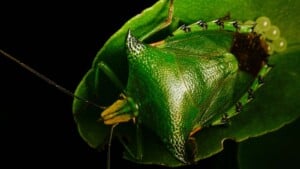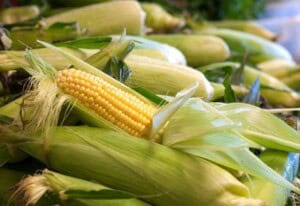Reading through Danny L. Barney’s new book Storey’s Guide To Growing Organic Orchard Fruits (Storey Publishing) not only got us to thinking about what it takes to grow apples, pears, cherries and other fruits without chemical sprays, but also, like a lot of things, made us nostalgic.
Your sentimental, fruit-crazy Planet Natural Blogger grew up on a small orchard back in Nebraska that was sprayed heavily every year. My father was in the pest control business and had access to the compounds and equipment. I remember him fogging the whole place in an effort to keep the mosquitoes and other insects down. Insects weren’t the problem, and needless to say the sprays did nothing to alleviate our real problem, blight and blemishes (and we still ended up with mosquitoes anyway). He didn’t wear a mask or respirator when doing this and neither did we. But we loved to run through the fog much to his chagrin (Note: Dad’s long gone but we’re still healthy).

SAFE & EFFECTIVE!
Bird-X
This lightweight netting is designed to protect fruits and berries from damage.
Learn moreBackyard trees and shrubs are important components of your landscape. With our selection of tree care products you can give them the attention needed for strong growth and maximum production. Got bugs? Click on our Orchard & Tree Problems page for insect descriptions and a list of earth-friendly remedies.
Maybe it was in reaction to this that — like a lot of former hippies — when we took to the land, we adopted an organic lifestyle. Those of us old enough to remember the Alar apple scare of 1989 probably aren’t surprised to know that the conventionally-grown fruits we buy are still tainted with harmful substances. Some of these chemicals are especially bad for children.
Readers of this blog know that we support buying organic fruits and vegetables. But we’re even more supportive of growing your own. That’s the best way to be sure that you’re supplying the purest, highest-quality foods to your family. Of course, this isn’t practical for almost all of us. Our home production of edibles can be measured in degrees, whether we live in apartments or on acreages. But for those of us with enough room for a fruit tree — or several — the idea of going organic is imperative.
Growing an organic fruit tree isn’t as easy as raising organic vegetables. But the principles are the same. And the central component to healthy trees and healthy crops — just as it is for healthy gardens and lawns — is healthy soil. Barney covers the history of orchard maintenance in the book and cites the advent of tractors and herbicides as a turning point. Prior to their introduction, weed maintenance consisted of hand-pulling and horse drawn tillage. Compaction was limited and biodiversity in the soil was assured. But when orchardists started mechanical tillage and spraying with herbicides — Barney calls it a “scorched earth approach”– soil compaction and erosion became huge problems. With them came a decrease in the soil’s microorganisms that led to poorer yields and a general decline in tree health.

Luckily, once these problems were recognized for what they were, growers started planting “alley” crops under their trees. Organic growers have found that alley crops increase organic material in the soil, thus helping soil structure, which influences water absorption, soil aeration, nutrient uptake and other factors, all leading to better root growth and healthier trees. The effect as Barney describes it is this: “everything we do in an orchard affects everything else.” Of course.
This is only a small part of the book, but an important one (it’s over 500 pages long). And while its directed mainly at those wanting to establish new orchards, it’s also applicable to those with just a tree or two who want to transition them away from conventional sprays and soil care. There are sections on varieties of fruits to plant and in which zones they’re appropriate. There are good tips on weed control– we like the section on the “solarization” technique of weed elimination — organic treatments for common problems like mites and flies, and guides to pruning and shaping. Overall lesson? Growing fruits organically is both practical and achievable. Want a shorter course in growing fruits organically? Go here.











